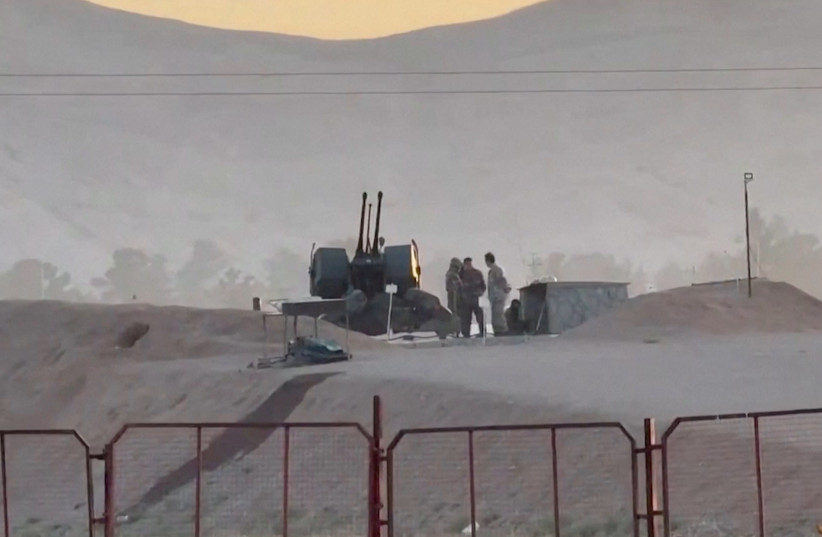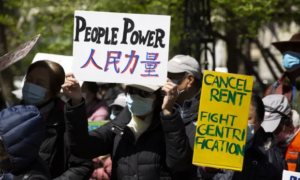Iran may be mere weeks away from developing nuclear weapons, according to the director general of the UN’s nuclear agency,
Rafael Grossi, head of the International Atomic Energy Agency (IAEA), the UN’s nuclear oversight organization, flew to Iran last week to strengthen the UN’s supervision of Iranian nuclear activities.
Iran has agreed to provide the agency with information about its nuclear facilitiesand access to cameras at its nuclear sights. Since 2022, many surveillance cameras have been removed, and traces of uranium have been found in unexpected locations.Top ArticlesRead More
New series focuses on issue of sexual assault – TV time
While in Iran, Grossi met with Mohammad Eslami, Iran’s nuclear chief.
Iran nearly has nuclear bomb
“Iran has never been closer to achieving a nuclear bomb,” Grossi told the press after his visit to Iran. “It is estimated that it may be a matter of weeks and not months away if [Supreme Leader Ali] Khamenei chooses to go this way.”
In 2018, Donald Trump’s administration decided to withdraw from the 2015 nuclear deal between Iran and the US. Under the deal, Iran agreed to limit its uranium stockpile and enrich uranium only to 3.67%, the purity needed to run nuclear power plants. In return, Iran received relief from sanctions imposed by the US, the EU, and the UN Security Council.
The US withdrawal from the nuclear deal has not stopped Iran’s nuclear plan. In fact, Tehran has used the withdrawal as an excuse to roll back cooperation with the IAEA and accelerate its uranium enrichment.

Darya Dolzikova, a research fellow at the Royal United Services Institute’s Proliferation and Nuclear Policy program, told The Media Line that Iran has achieved 60% uranium purity and is approaching the weapons-grade purity level of 90%.
“This is quite concerning,” she said.
Steven Biegalski, the chair of the Nuclear and Radiological Engineering and Medical Physics Program at Georgia Institute of Technology, said that 60% purity is “far beyond” the purity needed for nuclear power plants.
“It is, of course, a huge concern,” he said. “They are clearly staging themselves to reach their goal in one or two weeks without having any significant international sanctions against them.”
Dolzikova said that while producing sufficient fissile material for a nuclear weapon could take about a week, producing additional weapons would take longer.
“Once the uranium is enriched, it must be put inside a nuclear weapon, and then it is mounted onto a delivery system,” she said. “So, to produce more of them it actually takes longer, up from six months to a year.”
Daryl G. Kimball, the executive director of the US-based Arms Control Association, explained that monitoring Iran’s nuclear capacity has been difficult because the country has not provided the IAEA with all the necessary information.
“There are certain facilities that this institution has no access to since Iran has decertified its inspectors from some of them,” Kimball stated.
He called for the US, France, Germany, and the UK to push Iran to resume cooperation with the IAEA.
Iran becoming a nuclear power would set off a chain reaction in the Middle East and around the world.
“Several other countries may develop a clandestine military nuclear capability,” Simon Henderson, the director of the Gulf and Energy Policy Program at the Washington Institute, told The Media Line. “Egypt, Turkey, Saudi Arabia, and the UAE are regarded as the most likely. Moreover, Iran is clearly showing, by continuing the nuclear program, not only the impossibility to stop this through international policies but mainly the limits of the American power, its main enemy.”
According to Kimball, an Israeli or American strike on Iranian nuclear facilities would not bring an end to Iran’s nuclear program. “This can even escalate in the country’s withdrawal from the Nuclear Non-Proliferation Treaty to pursue in the long run a nuclear arsenal, which may protect the regime from foreign threats.”
Iran’s nuclear plant in Natanz is enriching uranium at a faster rate than ever before, and the country’s stock of uranium fuel continues to increase.
Iran started building the new underground facility in Natanz to replace the aboveground centrifuge assembly center, which was struck by an explosion in 2020. Iran claimed it was Israel’s responsibility.
Kimball said the new facility was built deep underground in order to avoid being targeted.
Biegalski said that Iran has clearly disobeyed the UN’s limits, installing additional centrifuges to reach higher uranium enrichment.
“Without military action and only the use of policies, it is almost impossible to stop this process,” he said.
The Iranian government has consistently stated that it has no intention of creating nuclear weapons, but after last month’s escalation between Iran and Israel, Kamal Kharazi, Khamenei’s adviser, took a different tack.
“If the Zionist regime [Israel] will launch an attack on our nuclear sites, our deterrence will change. We have the capability to create nuclear weapons, and we may use them in the future to protect ourselves,” Kharazi said in an interview with Al Jazeera.




